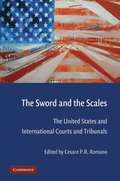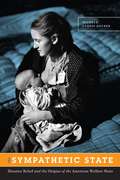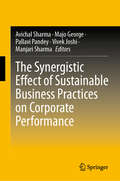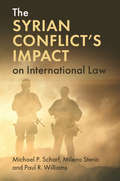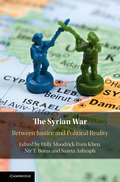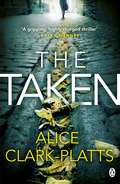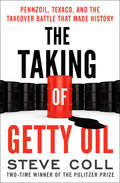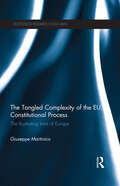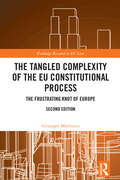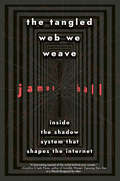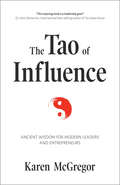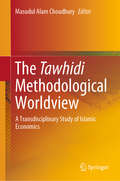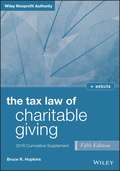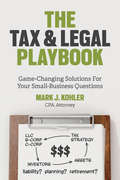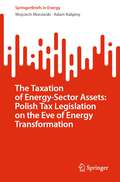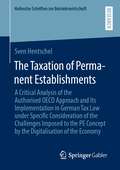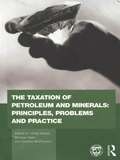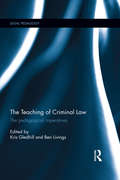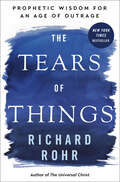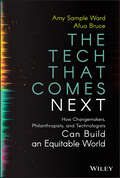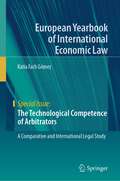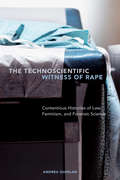- Table View
- List View
The Sword and the Scales: The United States and International Courts and Tribunals
by Cesare P. R. RomanoThe Sword and the Scales is the first in-depth and comprehensive study of attitudes and behaviors of the United States toward major international courts and tribunals, including the International Courts of Justice, WTO, and NAFTA dispute settlement systems; the Inter-American Court of Human Rights; and all international criminal courts. Thirteen essays by American legal scholars map and analyze current and past patterns of promotion or opposition, use or neglect, of international judicial bodies by various branches of the United States government, suggesting a complex and deeply ambivalent relationship. The United States has been, and continues to be, not only a promoter of the various international courts and tribunals but also an active participant of the judicial system. It appears before some of the international judicial bodies frequently and supports more, both politically and financially. At the same time, it is less engaged than it could be, particularly given its strong rule of law foundations and its historical tradition of commitment to international law and its institutions.
The Sympathetic State: Disaster Relief and the Origins of the American Welfare State
by Michele Landis DauberEven as unemployment rates soared during the Great Depression, FDR's relief and social security programs faced attacks in Congress and the courts on the legitimacy of federal aid to the growing population of poor. In response, New Dealers pointed to a long tradition--dating back to 1790 and now largely forgotten--of federal aid to victims of disaster. In The Sympathetic State, Michele Landis Dauber recovers this crucial aspect of American history, tracing the roots of the modern American welfare state beyond the New Deal and the Progressive Era back to the earliest days of the republic when relief was forthcoming for the victims of wars, fires, floods, hurricanes, and earthquakes. Drawing on a variety of materials, including newspapers, legal briefs, political speeches, the art and literature of the time, and letters from thousands of ordinary Americans, Dauber shows that while this long history of government disaster relief has faded from our memory today, it was extremely well known to advocates for an expanded role for the national government in the 1930s, including the Social Security Act. Making this connection required framing the Great Depression as a disaster afflicting citizens though no fault of their own. Dauber argues that the disaster paradigm, though successful in defending the New Deal, would ultimately come back to haunt advocates for social welfare. By not making a more radical case for relief, proponents of the New Deal helped create the weak, uniquely American welfare state we have today--one torn between the desire to come to the aid of those suffering and the deeply rooted suspicion that those in need are responsible for their own deprivation. Contrary to conventional thought, the history of federal disaster relief is one of remarkable consistency, despite significant political and ideological change. Dauber's pathbreaking and highly readable book uncovers the historical origins of the modern American welfare state.
The Synergistic Effect of Sustainable Business Practices on Corporate Performance
by Manjari Sharma Avichal Sharma Majo George Pallavi Pandey Vivek JoshiThis book explores the intricate relationship between sustainable business practices and economic performance. By examining how companies can achieve financial benefits through the integration of environmental and social responsibility into their core strategies, this book seeks to bridge the gap between environmental and economic concerns. It demonstrates that sustainability is not merely a moral imperative but a strategic economic driver in the modern business landscape. The book provides valuable insights into how companies can align their economic goals with environmental and social responsibilities, leading to long-term financial success. Readers will also benefit from the practical applications and case studies that demonstrate the tangible financial benefits of sustainable business practices. Additionally, the book serves as a resource for implementing sustainability strategies within organizations, making it an indispensable guide for business leaders, policymakers, and academics seeking to navigate the complexities of modern economic and environmental challenges.
The Syrian Conflict's Impact on International Law
by Michael P. Scharf Paul R. Williams Milena SterioWritten as the decade-long Syria conflict nears an end, this is the first book-length treatment of how the Syrian war has changed international law. In The Syrian Conflict's Impact on International Law, the authors explain the history of the current conflict in Syria and discuss the principles and process of customary international law formation and the phenomenon of accelerated formation of customary international law known as Grotian Moments. They then explore specific examples, including how use of force against ISIS in Syria has changed the law of self-defense against non-state actors, how the allied airstrikes in response to Syria's use of chemical weapons have changed the law of humanitarian intervention, and others. This book seeks to contribute both to understanding the concept of accelerated formation of customary international law and the specific ways the Syria conflict has led to development of new norms and principles in several areas of international law.
The Syrian War: Between Justice and Political Reality
by Khen Hilly Moodrick-Even Nir T. Boms Sareta AshraphStarting as a civil uprising calling for liberal reforms in March 2011, the unrest in Syria rapidly deteriorated into a proxy-led armed conflict involving multiple state-sponsored and non-state actors, including foreign militias and local armed groups. The current state of affairs in Syria, and the uncertainty regarding its future, raise numerous questions for scholars and practitioners of both international law and politics about justice within the context of a changing political reality in Syria. This book contributes uniquely to the scholarship on the Syrian war, raising voices from the Middle East and beyond not often heard within this research context. The volume is divided into three sections: Part I sets the factual and legal framework for the Syrian conflict; Part II focuses on the implications of the conflict for the Syrian neighbourhood; and Part III analyses possible post-conflict scenarios. Together, they address the key themes and questions of the conflicts.
The Taken: DI Erica Martin Book 2 (Erica Martin Thriller)
by Alice Clark-PlattsA tense and powerful police procedural set in the city of Durham where a murdered preacher may be more monstrous than his own killer.There's the lost.There's the missing.And there's the taken.She asked me once if we had any secrets, and I shook my head. 'No secrets between us,' she said. 'No,' I answered. 'Never ever.'In a Durham hotel at dawn, celebrated preacher Tristan Snow is murdered as he prays. None of the other guests - not even his daughter, his wife, or her sister - saw or heard anything. But then again, they all had a motive for murder.Detective Inspector Erica Martin is confronted by secrets and lies, lost in a case where nothing is what it seems.With no answers, DI Martin is consumed by questions: Is anyone in this family innocent? When the victim might have been a monster - is there such a thing as justice? And does anyone deserve to die?Praise for Alice Clark-Platts:'Had me on the edge of my sun lounger. Excellent plotting and a genuinely unguessable resolution to the mystery'Sophie Hannah'Grabbed me from the first page and wouldn't let go. A compelling read, beautifully written ... A tense, captivating tale, brilliantly told'Rachel Abbott'A gripping, highly charged thriller'Ralph Fiennes'A brilliantly plotted and utterly gripping thriller' Emma Kavanagh'Superb ... A very assured page-turning storm I read in one sitting'Stav Sherez'Intriguing and sinister with masterful plotting and tension' Mel Sherratt
The Taking of Getty Oil: Pennzoil, Texaco, and the Takeover Battle That Made History
by Steve CollA larger-than-life account of family, greed, and a courtroom showdown between Big Oil rivals from the New York Times–bestselling author of Private Empire. Pulitzer Prize–winning author Steve Coll is renowned for &“his ability to take complicated, significant business stories and turn them into quick-reading engaging narratives&” (Chicago Tribune). Coll is at the height of his talents in this &“riveting&” tale of one of the most spectacular—and catastrophic—corporate takeovers of all time (Newsday). As the head of a sprawling oil empire, J. Paul Getty was once the world&’s richest man. But by 1984, eight years after his death, Getty&’s legacy was in tatters: His children were locked in a bitter feud over the family trust and the company he founded was riven by boardroom turmoil. Then Pennzoil made an agreement with Getty&’s son, Gordon, to purchase Getty Oil. It was a done deal—until Texaco swooped in to claim the $10 billion prize. What followed was an epic legal battle that pit &“good ole boy&” J. Hugh Liedtke of Pennzoil against the Wall Street brokers behind Texaco&’s offer. The scandalous details of the case would shock the business world and change the landscape of the oil industry forever. With a large cast of colorful characters and the dramatic pacing of a novel, The Taking of Getty Oil is a &“suspenseful&” and &“always intriguing&” chronicle of one of the most fascinating chapters in American corporate history (Publishers Weekly).
The Taming of Free Speech
by Laura WeinribLaura Weinrib shows how a coalition of lawyers and activists made judicial enforcement of the Bill of Rights a defining feature of American democracy. Protection of civil liberties was a calculated bargain between liberals and conservatives to save the courts from New Deal attack and secure free speech for both labor radicals and businesses.
The Tangled Complexity of the EU Constitutional Process: The Frustrating Knot of Europe (Routledge Research in EU Law)
by Giuseppe MartinicoDespite the rejection of the EU Constitutional Treaty eventually leading to the adoption of the Lisbon Treaty, the debates concerning the European Union’s constitutional framework continue. This book builds on the discourse in European Union constitutionalism in order to offer a novel analysis of the EU’s constitutional developments. Giuseppe Martinico sets out a unique account of EU constitutionalism which argues that the EU legal order is a complex entity which shares some features with natural systems. The book is soundly anchored in the theory and methodology of legal science and based on a deep knowledge of judicial practices. The author contends that Europe is still suffering from the failure of the Constitutional Treaty and is practicing the new institutional equilibrium afforded by the coming into force of the Reform Treaty. The book goes on to explore the methodological implications of such constitutional complexity for the study of EU law. The Tangled Complexity of the EU Constitutional Process will be of particular interest to academics and students in the disciplines of Law, International Relations and Political Science.
The Tangled Complexity of the EU Constitutional Process: The Frustrating Knot of Europe (Routledge Research in EU Law)
by Giuseppe MartinicoOffering a fresh view on the EU constitutionalisation process, the new edition of The Tangled Complexity of the EU Constitutional Process presents three main points: the idea of constitutional complexity, the tension between constitutional evolutionism and constitutional constructivism in the process of European integration, and the functional nature of conflicts in the evolution of the EU. Because of its prodigiousness, European law produces consternation among constitutionalists accustomed to traditional patterns of power. This book argues that while constitutional conflicts have frequently been depicted as elements of disturbance along the path towards legal coherence, they are physiological and might even be functional to the development of the European legal order, which should not be understood in a deterministic manner. The new edition will be of particular interest to academics and students in the disciplines of law, international relations, and political science.
The Tangled Web We Weave: Inside The Shadow System That Shapes the Internet
by James BallWe all see what the internet does and increasingly don't like it, but do we know how and more importantly who makes it work that way? That's where the real power lays... <P><P>The internet was supposed to be a thing of revolutions. As that dream curdles, there is no shortage of villains to blame--from tech giants to Russian bot farms. But what if the problem is not an issue of bad actors ruining a good thing? What if the hazards of the internet are built into the system itself? <P><P>That's what journalist James Ball argues as he takes us to the root of the problem, from the very establishment of the internet's earliest protocols to the cables that wire it together. He shows us how the seemingly abstract and pervasive phenomenon is built on a very real set of materials and rules that are owned, financed, designed and regulated by very real people. <P><P>In this urgent and necessary book, Ball reveals that the internet is not a neutral force but a massive infrastructure that reflects the society that created it. And making it work for--and not against--us must be an endeavor of the people as well.
The Tao of Influence: Ancient Wisdom for Modern Leaders and Entrepreneurs
by Karen McGregorHow to Become a Great LeaderBy translating The Tao Te Ching into simple steps for greater influence, Karen has created a powerful tool for today’s leaders.” ―Andrea Menard, Métis Song KeeperWall Street Journal Bestseller2021 International Book Awards finalist in Business: Management & Leadership#1 New Release in Eastern Philosophy, TaoismPeople are yearning to make an impact and create much needed change. Building a business, starting a movement, generating a new initiative in the workplace, creating change within a family, or supporting a non-profit enterprise in the community? People want to be part of the solution. Author Karen McGregor believes the 4000-year-old “Four Pillars of Influence” of the Tao Te Ching may be the key.Positive vibes and how to influence others. Author Karen McGregor is an international keynote and TEDx speaker, and a guide to thousands of entrepreneurs and professionals seeking to become more influential leaders. In this book each chapter begins with a quote from the Tao Te Ching that connects with that chapter’s theme, then concludes with reflections and recommended actions.A unique leadership skills book. The Tao of Influence stands apart as a business book. It speaks ancient wisdom to the modern-day leader, while providing practical and tangible actions that lead to high levels of sustainable influence and positive power. Discover an easy-to-follow roadmap to creating lasting change in your workplace, community, and family, while navigating chaotic and demanding environments.Learn to:Handle challenges and difficult peopleEnd the dynamic that heightens power struggles and destroys influenceCreate stillness and space to generate authentic powerIf you have read books such as Weconomy, Leaders Eat Last, Radical Candor, Difficult Conversations, or Eckhart Tolle’s A New Earth, you will want to read and learn from Karen McGregor’s The Tao of Influence.
The Tawhidi Methodological Worldview: A Transdisciplinary Study of Islamic Economics
by Masudul Alam ChoudhuryThis book develops and applies the methodology of Tawhid (“monotheism”) as law and the Sunnah (the teachings of Prophet Muhammad) in the Qur’an in establishing a transdisciplinary foundation for the study of Islamic economics, finance, society, and science. It employs the Tawhidi String Relation (TSR), a new theoretical framework in contemporary Islamic sciences, in the methodological formalisation and application of the Tawhidi worldview - as the primal ontological law of monotheism. It employs a deeply Qur’anic exegesis, and a mathematical, philosophical, and socio-scientific mode of inquiry in deriving, developing, and empirically applying the Qur’anic methodology of “unity of knowledge”. It is the first book of its kind in rigorously studying the true foundation of the Qur’anic concept of ‘everything’ - as the world-system extending between the heavens and Earth. The qur’anic terminology of the precept of this “world-system” in its most comprehensive perspective is A’lameen, the terminology in the Qur’an that accounts for the generality and details of the world-systems that are governed by the method of evaluation of the objective criterion of wellbeing. Wellbeing objective criterion is evaluated subject to inter-causal relations between systemic entities, variables, and functions. The cardinal principle of Tawhid in its relationship with the world-system conveys the corporeal meaning of monotheism in its cognitive implication of abstraction and application. Such a study has not been undertaken in existing Islamic socio-scientific literature in analysing Islamic economics, finance, science, and society collectively, using Tawhidi law as a theoretical framework. This book will be relevant to all such scholars who are interested in studying the monotheistic law and the Islamic principles, particularly Tawhid, Shari’ah, and Islamic philosophical thought.
The Tax Law of Charitable Giving 2016 Cumulative Supplement
by Bruce R. HopkinsThe classic tax guide for charitable giving, updated and expanded for 2016 The Tax Law of Charitable Giving is the leading guide to the rules, regulations, and laws governing charitable gifts, written by one of the most trusted legal authorities on tax-exempt organizations. Completely revised, revamped, and updated for 2016, this invaluable guide provides plain-English explanations and supporting documentation to assist in the decision making process. This supplement includes discussion of the new healthcare tax on investment income of trusts and the impact on pooled income funds, updates to federal estate tax law, and case law on substantiation and appraisal requirements, as well as detailed coverage of new Department of Treasury regulations concerning recordkeeping, an update of law summary for donor-advised funds, and an updated summary of recent legislation's impact on the U.S. tax system. Supporting citations and documentation are provided, and references to rulings, regulations, cases, and tax literature are included throughout. The companion website features appendices, tables, IRS examination guidelines for charitable giving, and more, to help you stay fully up-to-date with the most current tax laws related to charitable giving. Tax law changes continuously, and the rules surrounding charitable gifts are under increasing scrutiny. This book provides clear, easy-to-follow guidance on the latest updates to help ensure complete compliance and well-informed decision-making. Get up to date on the most recent charitable gift regulations Dig deep into healthcare tax, federal estate tax, donor-advised funds, and more Gain access to downloadable tables, IRS guidelines, and other helpful documents Make the right decisions about your organization's fund-development program With comprehensive, authoritative guidance and the most current applicable laws, rules, and regulations, The Tax Law of Charitable Giving is an invaluable resource for any tax-exempt organization.
The Tax and Legal Playbook
by Mark J. KohlerThe Tax and Legal Playbook: Strategies that Save You Time and MoneyCPA and Attorney Mark J. Kohler answers the leading tax and legal questions facing small business owners, across all stages of business, and delivers a comprehensive playbook of clear-cut truths, thought-provoking advice, and underutilized solutions to save you time, money, and heartache.You can read this book straight through or as a reference guide-reading the chapters as needed to answer the questions as they arise. You'll come away wiser and better equipped to make the best decisions for your business, your family, and yourself.Covers: The ins and outs behind fundamental business decisions Underutilized tax and legal strategies that can save you thousands Picking the right legal entity for your business Common legal scams and deceptions to avoid Protecting your assets and planning for retirement Issues are illustrated with entertaining, real-world examplesths, thoughtful advice, and outside-of-the-box thinking shared in his many Entrepreneur.com contributions, speaking events, and previous books - Lawyers Are Liars and What Your CPA Isn't Telling You - Kohler presents a simplified look at the complex questions within the areas of legal and tax planning for business.
The Taxation of Corporate Groups under Consolidation
by Antony TingThe rise of corporate groups in the last century dictates a shift in the income tax law: instead of treating each company as a separate taxpayer, the tax consolidation regime is increasingly common. Antony Ting presents the first comprehensive comparative study of eight consolidation regimes in Australia, France, Italy, Japan, the Netherlands, New Zealand, Spain and the USA. In the study, he critically analyses and compares alternative policy options with respect to ten key structural elements. The study improves understanding of the design and implementation of consolidation regimes and sets the stage for the search for a model. It provides valuable information with respect to the best practices, as well as the pitfalls, in the design of a consolidation regime. The book is essential to countries contemplating the introduction of a new consolidation regime and offers important insights into the management of such a complex structure through careful policy-orientated choices.
The Taxation of Energy-Sector Assets: Polish Tax Legislation on the Eve of Energy Transformation (SpringerBriefs in Energy)
by Wojciech Morawski Adam KałążnyThis book answers the question: is Polish property tax legislation ready for the upcoming energy transformation?In Poland, real estate tax (property tax) is a material cost for property owners in energy because of the high value assets used by the sector. At the same time, unclear provisions of Polish tax law and variable jurisprudence can make it challenging for entrepreneurs to predict their tax bills. The current provisions of Polish tax law are often not well adjusted to the reality of modern economy, particularly in the case of assets used in the renewable energy sector. The book describes the problems that face taxpayers, tax authorities, and the administrative courts trying to apply current real estate tax provisions to renewable energy assets. The authors also examine the question of whether Polish legislators treat traditional and renewable sources of energy fairly.The readers of this book will be practitioners and researchers who are interested in issues of renewable energy taxation.
The Taxation of Permanent Establishments: A Critical Analysis of the Authorised OECD Approach and Its Implementation in German Tax Law under Specific Consideration of the Challenges Imposed to the PE Concept by the Digitalisation of the Economy (Hallesche Schriften zur Betriebswirtschaft #37)
by Sven HentschelThis book provides a comprehensive analysis of the rules governing the taxation of permanent establishments as implemented in the OECD Model Tax Convention and German national tax law. Deviations between the OECD approach and the German approach are identified and modifications to the rules as a result of the Base Erosion and Profit Shifting (BEPS) project are examined. Moreover, challenges imposed to the PE concept as a result of the digitalisation of the economy are identified and discussed. Against this background, the Pillar One Blueprint proposing a long-term solution to overcome the tax challenges arising from the digitalisation of the economy is presented and assessed against widely accepted overarching principles of tax policy.
The Taxation of Petroleum and Minerals: Principles, problems and practice
by Michael Keen Philip Daniel Charles McphersonThere are few areas of economic policy-making in which the returns to good decisions are so highâ "and the punishment of bad decisions so cruelâ "as in the management of natural resource wealth. Rich endowments of oil, gas and minerals have set some countries on courses of sustained and robust prosperity; but they have left others riddled with corruption and persistent poverty, with little of lasting value to show for squandered wealth. And amongst the most important of these decisions are those relating to the tax treatment of oil, gas and minerals. This book will be of interest to Economics postgraduates and researchers working on resource issues, as well as professionals working on taxation of oil, gas and minerals/mining.
The Teaching of Criminal Law: The pedagogical imperatives (Legal Pedagogy)
by Kris Gledhill Ben LivingsThe Teaching of Criminal Law provides the first considered discussion of the pedagogy that should inform the teaching of criminal law. It originates from a survey of criminal law courses in different parts of the English-speaking world which showed significant similarity across countries and over time. It also showed that many aspects of substantive law are neglected. This prompted the question of whether any real consideration had been given to criminal law course design. This book seeks to provide a critical mass of thought on how to secure an understanding of substantive criminal law, by examining the course content that best illustrates the thought process of a criminal lawyer, by presenting innovative approaches for securing active learning by students, and by demonstrating how criminal law can secure other worthwhile graduate attributes by introducing wider contexts. This edited collection brings together contributions from academic teachers of criminal law from Australia, New Zealand, the United Kingdom, and Ireland who have considered issues of course design and often implemented them. Together, they examine several innovative approaches to the teaching of criminal law that have been adopted in a number of law schools around the world, both in teaching methodology and substantive content. The authors offer numerous suggestions for the design of a criminal law course that will ensure students gain useful insights into criminal law and its role in society. This book helps fill the gap in research into criminal law pedagogy and demonstrates that there are alternative ways of delivering this core part of the law degree. As such, this book will be of key interest to researchers, academics and lecturers in the fields of criminal law, pedagogy and teaching methods.
The Teaching of Criminal Law: The pedagogical imperatives (Legal Pedagogy)
by Kris Gledhill Ben LivingsThe Teaching of Criminal Law provides the first considered discussion of the pedagogy that should inform the teaching of criminal law. It originates from a survey of criminal law courses in different parts of the English-speaking world which showed significant similarity across countries and over time. It also showed that many aspects of substantive law are neglected. This prompted the question of whether any real consideration had been given to criminal law course design. This book seeks to provide a critical mass of thought on how to secure an understanding of substantive criminal law, by examining the course content that best illustrates the thought process of a criminal lawyer, by presenting innovative approaches for securing active learning by students, and by demonstrating how criminal law can secure other worthwhile graduate attributes by introducing wider contexts. This edited collection brings together contributions from academic teachers of criminal law from Australia, New Zealand, the United Kingdom, and Ireland who have considered issues of course design and often implemented them. Together, they examine several innovative approaches to the teaching of criminal law that have been adopted in a number of law schools around the world, both in teaching methodology and substantive content. The authors offer numerous suggestions for the design of a criminal law course that will ensure students gain useful insights into criminal law and its role in society.This book helps fill the gap in research into criminal law pedagogy and demonstrates that there are alternative ways of delivering this core part of the law degree. As such, this book will be of key interest to researchers, academics and lecturers in the fields of criminal law, pedagogy and teaching methods.
The Tears of Things: Prophetic Wisdom for an Age of Outrage
by Richard RohrIn his first major work since The Universal Christ, one of our most prominent spiritual voices offers a wholehearted and hope-filled model for the world today, grounded in the timeless wisdom of the Hebrew prophets. <p> “Richard Rohr is one of the great Christian spiritual masters of our time. Of any time.”—James Martin, SJ, author of Come Forth. <p> How do we live compassionately in a time of violence and despair? What can we do with our private disappointments and the anger we feel in such an unjust world? In his most personal book yet, Richard Rohr turns to the writings of the Jewish prophets, revealing how some of the lesser-read books of the Bible offer us a crucial path forward today. The prophets’ writings reflect the full spectrum of human maturity. In almost every case, their initial rage and their accusatory words evolve into a profound pathos and lamentation about our shared human condition and the world’s suffering. Through astute critiques of culture and institutions, and their journey from anger to sadness, and ultimately compassion, the prophets exemplify what Rohr calls “sacred criticism”—a distinct approach to confronting evil and injustice that acknowledges the wholeness of history, the interconnectedness of every living being, and the reality of a divine and universal love. In this, they set the stage for Jesus, who follows this identical pattern. <p> Drawing on a century of biblical scholarship and written in the warm, pastoral voice that has endeared Rohr to millions, The Tears of Things breathes new life into ancient wisdom. It paves a path of enlightenment for anyone seeking a compassionate way of living in a hurting world. <b>New York Times Bestseller</b>
The Tech That Comes Next: How Changemakers, Philanthropists, and Technologists Can Build an Equitable World
by Amy Sample Ward Afua BruceChanging the way we use, develop, and fund technology for social change is possible, and it starts with you. The Tech That Comes Next: How Changemakers, Philanthropists, and Technologists Can Build an Equitable World outlines a vision of a more equitable and just world along with practical steps to creating it, appropriately leveraging technology along the way. In the book, you'll find: Strategies for changing culture and investments inside social impact organizations Ways to change technology development so it incorporates more of society Examples of data, security, and privacy laws and policies that need to change to protect vulnerable populations and advance positive change Ideal for nonprofit leaders, social activists, policymakers, technologists, entrepreneurs, founders, managers, and other business leaders, The Tech That Comes Next belongs in the libraries of anyone who envisions a world in which technology helps advance, rather than hinders, positive social change.
The Technological Competence of Arbitrators: A Comparative and International Legal Study (European Yearbook of International Economic Law)
by Katia Fach GómezArbitration is facing revolutionary changes due to new technologies’ irruption into the entire arbitration proceeding. Wide-ranging technical-legal concepts such as e-discovery, e-hearing, cyber-security protocol, e-deliberations, algorithmic decision-making and digital signing have become part of life. Technology’s impact on arbitration is unlikely to decrease after the COVID crisis; on the contrary, how the arbitration community positions itself vis-à-vis technology will be a key factor in determining arbitration’s future. Faced with this challenging scenario, the book discusses a novel legal topic: arbitrators’ relationship with this increasingly ubiquitous, rapidly-changing technology. This innovative book applies journalism’s “5 W questions” to the underexplored issue of arbitrators’ digital competence. It reaches a workable definition of what digital competence in the current arbitration context is, also providing answers to the essential question of why arbitrators’ digital competence is relevant from legal and financial points of view. Attention then shifts to who, with reflections on arbitrators working in a highly technological context and clarification of their relationship with other legal and non-legal actors. The book equally offers an in-depth comparative study of the question of where arbitrators’ technological competence is regulated, with critical analysis of soft and hard law provisions that may impose a digital competence duty. Finally, the book specifies when arbitrators need to be digitally competent and develops legal proposals regarding key procedural stages (initial conference, hearings) and legal topics (cybersecurity, data protection). The first study to scrutinise the rapidly changing relationship between arbitrators and technology, the book aims to spark a crucial debate among practitioners and scholars. Academically rigorous and using the latest legal material, it emphasises arbitrators’ needs, rights and duties in our technological age, presenting them alongside carefully selected practical topics. The unprecedented and well-grounded proposals for arbitrators’ digital competence are intended to be a call to action for its broad target audience.
The Technoscientific Witness of Rape: Contentious Histories of Law, Feminism, and Forensic Science
by Andrea QuinlanIn 1984, the Sexual Assault Evidence Kit (SAEK) was dubbed "Ontario’s most successful rapist trap." Since then, the kit has become the key source of evidence in the investigation and prosecution of sexual assault as well as a symbol of victims’ improved access to care and justice. Unfortunately, the SAEK has failed to live up to these promises. The Technoscientific Witness of Rape is the first book to chart the thirty year history of the sexual assault evidence kit and its role in a criminal justice system that re-victimizes many assault victims in their quest for medical treatment and justice. Drawing on actor-network theory and feminist technology studies, Andrea Quinlan combs through sixty-two interviews with police, nurses, scientists, and lawyers, as well as archival records and legal cases to trace changes in sexual assault forensics, law, advocacy, and anti-violence activism in Ontario. Through this history Quinlan bravely and provocatively argues that the SAEK reflects and reinforces the criminal justice system’s distrust of sexual assault victims.
